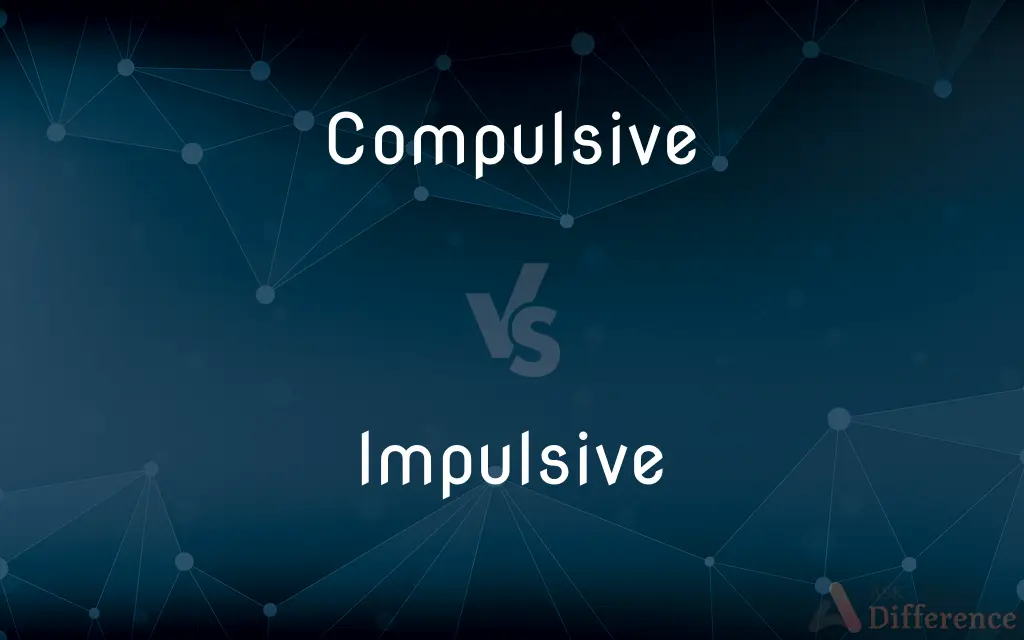Compulsive vs. Impulsive — What's the Difference?
Edited by Tayyaba Rehman — By Fiza Rafique — Updated on March 15, 2024
Compulsive behavior is driven by an overwhelming urge to perform specific acts repeatedly, often to relieve anxiety. Impulsive behavior is characterized by sudden, unplanned actions without considering the consequences.

Difference Between Compulsive and Impulsive
Table of Contents
ADVERTISEMENT
Key Differences
Compulsive behavior involves repeated actions driven by an uncontrollable urge, often linked to anxiety relief or preventing some perceived disaster. These behaviors are typically part of a routine or ritual that the individual feels must be performed to avoid negative outcomes. On the other hand, impulsive behavior is marked by spontaneous decisions and actions, usually carried out with little to no forethought or consideration of potential risks or consequences. Impulsivity is often driven by a desire for immediate gratification or relief from discomfort, without the repetitive or ritualistic nature seen in compulsive behaviors.
Compulsiveness is often associated with disorders such as Obsessive-Compulsive Disorder (OCD), where the compulsions are symptoms of the underlying condition, serving as coping mechanisms for the person. Whereas, impulsivity can be a characteristic of various conditions, including Attention Deficit Hyperactivity Disorder (ADHD), personality disorders, and substance abuse, reflecting a broader range of psychological issues.
In the realm of psychological treatment, compulsive behaviors are often addressed through therapies aimed at reducing the anxiety that triggers them, such as Cognitive Behavioral Therapy (CBT) and Exposure and Response Prevention (ERP). Meanwhile, interventions for impulsive behavior may focus on increasing self-control and mindfulness, employing strategies like behavior modification and impulse control training.
The impact of compulsive and impulsive behaviors on an individual's life can be significantly different. Compulsive behaviors can lead to time-consuming rituals, significantly impairing daily functioning and social interactions. In contrast, impulsive behaviors can result in harmful or risky actions, such as substance abuse or reckless driving, posing immediate dangers to the individual and others.
Understanding the distinction between compulsive and impulsive behaviors is crucial for effective psychological assessment and treatment. While both can disrupt an individual's life, the underlying motivations, associated conditions, and therapeutic approaches differ, highlighting the importance of accurate diagnosis and tailored interventions.
ADVERTISEMENT
Comparison Chart
Definition
An overwhelming urge to perform specific acts repeatedly, often for anxiety relief.
Sudden actions taken without forethought, driven by immediate desires.
Associated Conditions
Often linked to Obsessive-Compulsive Disorder (OCD).
Common in Attention Deficit Hyperactivity Disorder (ADHD), personality disorders.
Underlying Motivation
Driven by a need to relieve anxiety or prevent perceived negative outcomes.
Driven by a desire for immediate gratification or relief from discomfort.
Nature of Behavior
Repetitive and ritualistic.
Spontaneous and without consideration of consequences.
Treatment Approaches
Cognitive Behavioral Therapy (CBT), Exposure and Response Prevention (ERP).
Behavior modification, impulse control training.
Compare with Definitions
Compulsive
An irresistible urge to perform specific actions repeatedly.
A person feels compelled to wash their hands exactly five times after touching a doorknob.
Impulsive
Driven by the desire for immediate pleasure or relief.
Eating an entire cake in one sitting to feel better.
Compulsive
Actions are performed to alleviate anxiety or prevent a feared event.
Repeatedly checking the stove to ensure it's off to prevent a fire.
Impulsive
Acting on the spur of the moment without planning.
Impulsively buying a car without considering financial implications.
Compulsive
Involves rituals or routines that the person feels must be completed.
Organizing books in a precise order to alleviate distress.
Impulsive
Can be a symptom of ADHD, personality disorders.
Interrupting others frequently, a common impulse control issue in ADHD.
Compulsive
Can consume significant amounts of time, interfering with daily life.
Spending hours in cleaning rituals, leaving little time for other activities.
Impulsive
Not thinking about the consequences of actions.
Quitting a job on a whim without having another one lined up.
Compulsive
Often a symptom of Obsessive-Compulsive Disorder.
Constantly checking doors are locked due to an overwhelming fear of burglary.
Impulsive
Often involves taking unnecessary risks.
Driving recklessly for the thrill of it.
Compulsive
Having the capacity to compel
A frightening, compulsive novel.
Impulsive
Inclined to act on impulse rather than thought.
Compulsive
(Psychiatry) Caused or conditioned by compulsion or obsession.
Impulsive
Motivated by or resulting from impulse
Such impulsive acts as hugging strangers.
Impulsive generosity.
Compulsive
A person with behavior patterns governed by a compulsion.
Impulsive
Having force or power to impel or incite; forceful.
Compulsive
Uncontrolled or reactive and irresistible.
Jenny is a compulsive liar - don't believe a thing she says.
Impulsive
(Physics) Acting within brief time intervals. Used especially of a force.
Compulsive
Having power to compel; exercising or applying compulsion.
Impulsive
Having the power of driving or impelling; giving an impulse; moving; impellent.
Compulsive
One who exhibits compulsive behaviours.
Impulsive
Actuated by impulse or by transient feelings; inclined to make rapid decisions without due consideration.
Compulsive
Having power to compel; exercising or applying compulsion.
Religion is . . . inconsistent with all compulsive motives.
Impulsive
(mechanics) Acting momentarily, or by impulse; not continuous – said of forces.
Compulsive
A person with a compulsive disposition; someone who feels compelled to do certain things
Impulsive
That which impels or gives an impulse; an impelling agent.
Compulsive
Caused by or suggestive of psychological compulsion;
Compulsive drinking
Impulsive
One whose behaviour or personality is characterized by being impulsive.
Compulsive
Strongly motivated to succeed
Impulsive
Having the power of driving or impelling; giving an impulse; moving; impellent.
Poor men! poor papers! We and theyDo some impulsive force obey.
Impulsive
Actuated by impulse or by transient feelings.
My heart, impulsive and wayward.
Impulsive
Acting momentarily, or by impulse; not continuous; - said of forces.
Impulsive
That which impels or gives an impulse; an impelling agent.
Impulsive
Proceeding from natural feeling or impulse without external stimulus;
An impulsive gesture of affection
Impulsive
Without forethought;
Letting him borrow her car was an impulsive act that she immediately regretted
Impulsive
Having the power of driving or impelling;
A driving personal ambition
The driving force was his innate enthusiasm
An impulsive force
Impulsive
Determined by chance or impulse or whim rather than by necessity or reason;
A capricious refusal
Authoritarian rulers are frequently capricious
The victim of whimsical persecutions
Impulsive
Characterized by undue haste and lack of thought or deliberation;
A hotheaded decision
Liable to such impulsive acts as hugging strangers
An impetuous display of spending and gambling
Madcap escapades
Common Curiosities
Is compulsive behavior always related to OCD?
While closely associated with OCD, compulsive behaviors can also manifest in other conditions or as isolated symptoms.
Can impulsive behavior be controlled?
Yes, through techniques like behavior modification and impulse control training, individuals can learn to manage impulsive behaviors.
How does impulsivity affect relationships?
Impulsivity can strain relationships due to unpredictable or reckless actions that may harm or upset others.
What triggers compulsive behavior?
Compulsive behaviors are often triggered by anxiety or the need to prevent perceived negative outcomes.
Is it common for someone to exhibit both compulsive and impulsive behaviors?
While they stem from different underlying mechanisms, it's possible for an individual to exhibit both types of behaviors, especially if they have comorbid conditions.
Can lifestyle changes help manage these behaviors?
Yes, lifestyle changes like regular exercise, a healthy diet, and mindfulness practices can support the management of both compulsive and impulsive behaviors.
Can therapy help with compulsive behaviors?
Yes, therapies like CBT and ERP are effective in managing and reducing compulsive behaviors.
Are there any medications for compulsive or impulsive behaviors?
Medications, particularly SSRIs, are often used to treat compulsive behaviors, while impulsivity may be managed with ADHD medications or mood stabilizers, depending on the underlying condition.
What is the main difference between compulsive and impulsive behavior?
The main difference lies in the motivation and nature of the behaviors; compulsive behaviors are repetitive and anxiety-driven, while impulsive behaviors are spontaneous and driven by immediate desires.
How do these behaviors impact daily life?
Compulsive behaviors can significantly impair daily functioning through time-consuming rituals, whereas impulsive behaviors can lead to harmful or risky actions.
Share Your Discovery

Previous Comparison
Tamil vs. Sanskrit
Next Comparison
Roof vs. RooftopAuthor Spotlight
Written by
Fiza RafiqueFiza Rafique is a skilled content writer at AskDifference.com, where she meticulously refines and enhances written pieces. Drawing from her vast editorial expertise, Fiza ensures clarity, accuracy, and precision in every article. Passionate about language, she continually seeks to elevate the quality of content for readers worldwide.
Edited by
Tayyaba RehmanTayyaba Rehman is a distinguished writer, currently serving as a primary contributor to askdifference.com. As a researcher in semantics and etymology, Tayyaba's passion for the complexity of languages and their distinctions has found a perfect home on the platform. Tayyaba delves into the intricacies of language, distinguishing between commonly confused words and phrases, thereby providing clarity for readers worldwide.















































